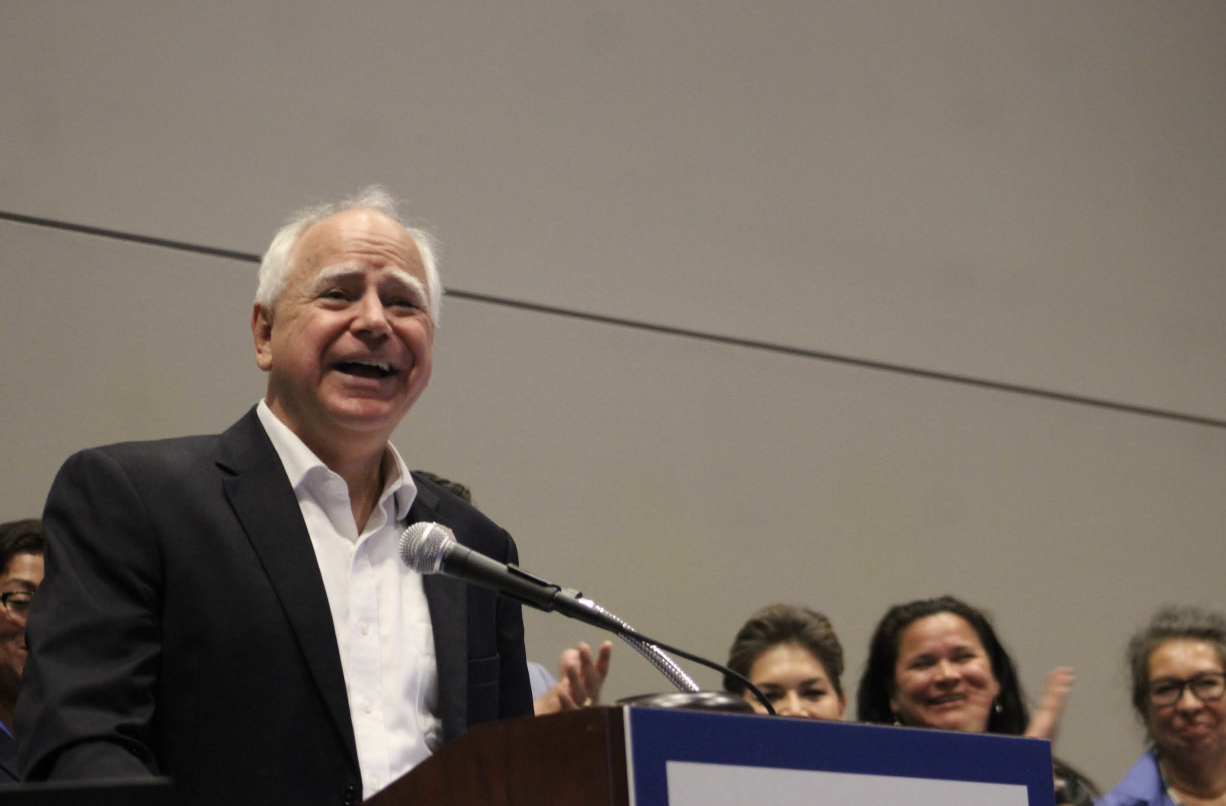
- Details
- By Levi Rickert
Native Vote 2024. CHICAGO — Today, Monday August 19, marks the beginning of the 2024 Democratic National Convention. Democratic Vice President nominee, Minnesota Gov. Tim Walz and Democratic Party Chair Jaime Harrison made a surprise appearance and spoke at the first Native American Caucus meeting of the week.
Before he started speaking, the Native Caucus attendees started to chant, “Coach!, Coach!, Coach!,” in reference to his time as a high school football coach who led his team to a state championship in Minnesota.
The appearance of Walz and Harrison energized the crowd of 250 Native Americans as they emphasized the importance of voting in this November election. Among the Native American Caucus were: Navajo Nation President Buu Nygren, Gila River Indian Community Governor Stephen Roe Lewis, Mashantucket Pequot Tribal Nation Chairman Rodney Butler, Tunica-Buloxi Tribe of Louisana Chairman Marshall Pierite, Tohono O’odham Chairman Verlon Jose, Suquamish Tribe Chairman Leonard Forsman, Oneida Vice Chairman Brandon Stevens,and Pokagon Band of Potawatomi Treasurer Alex Wesaw.
Walz spoke to the accomplishments made in his home state of Minnesota for the eleven federally recognized tribes in the state. Minnesota passed state legislation on Indian Child Welfare Act (ICWA) as a safeguard to the U.S. Supreme Court ruling that could have nullified ICWA.
Walz reminded the crowd that if Vice President Kamala Harris and him win the presidential and vice presidential seat, Anishinaabe woman, Lt. Governor of Minnesota Peggy Flanagan will fill the seat as Minnesota Governor. This will make her the highest elected Native.
“When we elect Vice President Harris to the presidency and me to the vice presidency, we have a Minnesota woman, Lt. Gov. Peggy Flanagan, an Anishinaabe woman, will become the first female governor of a state. A vote for our ticket is a vote for Peggy,” Walz said.
Walz said we cannot take victory for granted and it will take hard work to win in November.
“Harris understands a little about perseverance, understands a little about community, understands a little bit about preparing for the future, not just tomorrow, but for generations out,” said Walz. “I've been saying, this hard work is not scary. I've been telling people we can sleep when we're dead.”
Senator Cory Booker’s speech felt like a church sermon as he shared powerful anecdotes from his life. He shared a story from 2012 before as a huge storm was coming into New Jersey. He was driving around before the storm to check on the city when he came across a down tree that also took down power lines. It was there he saw a bright flood light being held by an older gentleman in the storm who, when asked by Booker, said he was making sure no one ran into the down trees and lines.
“That is the strength of our ancestors. The ones who stood on the hill, who stood in the storm putting themselves at risk,” said Booker.
There are still challenges ahead as we progress towards November especially when it comes to access to voting in Indian Country. Understanding the districting when it comes to local elections is a challenge Janeen Comenote, Executive Director of National Urban Indian Family Coalition, cites as one of the barriers to Natives exercising their right to vote.
The moderator for the first panel, Kim Teehee (Cherokee) is the first delegate-designee to the U.S. Congress from the Cherokee Nation
“Resources follow policy, and policy follows elections,” said Comenote.
The Democratic National Convention runs until Thursday night when Vice President Kamala Harris formally accepted the nomination for president of the United States. A second Native American Caucus is scheduled for Wednesday morning.
More Stories Like This
Native News Weekly (August 25, 2024): D.C. BriefsNavajo Nation Mourns the Passing of Former Vice President Rex Lee Jim
Deb Haaland Earns Endorsement From Communications Workers of America Local 7076
University Soccer Standout Leads by Example
Two Native Americans Named to Democratic Congressional Campaign Committee's“Red to Blue” Program
Help us defend tribal sovereignty.
At Native News Online, our mission is rooted in telling the stories that strengthen sovereignty and uplift Indigenous voices — not just at year’s end, but every single day.
Because of your generosity last year, we were able to keep our reporters on the ground in tribal communities, at national gatherings and in the halls of Congress — covering the issues that matter most to Indian Country: sovereignty, culture, education, health and economic opportunity.
That support sustained us through a tough year in 2025. Now, as we look to the year ahead, we need your help right now to ensure warrior journalism remains strong — reporting that defends tribal sovereignty, amplifies Native truth, and holds power accountable.
 The stakes couldn't be higher. Your support keeps Native voices heard, Native stories told and Native sovereignty defended.
The stakes couldn't be higher. Your support keeps Native voices heard, Native stories told and Native sovereignty defended.
Stand with Warrior Journalism today.
Levi Rickert (Potawatomi), Editor & Publisher


